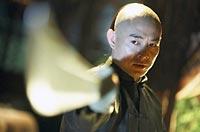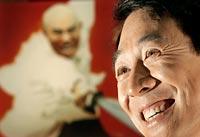Martial-arts master says it's not about the fighting

I have just given Jet Li two chances to hurt or kill me.
First, by starting the interview with: "What if I were to tell you that my kung fu is stronger than yours?" In the vernacular of martial-arts flicks, he is now completely within his rights to leap over the table.
Second, by asking the superstar to demonstrate a move from his breathtaking new film, "Fearless." On me. (The last time I asked that, David Carradine abruptly grabbed my windpipe.)
But Li is imperturbable. Serene, even.
"I never want to hurt people. That's not a true martial art," he says.
That's also the message of "Fearless," which opened Friday, and which Li promises is his final martial-arts flick ever. Even though he's a relatively young 43, and no bloated Steven Seagal.
But with the simple (yet stupendously ass-kicking) morality tale, he's said all he has to say. Set in China circa 1900, it follows the life-journey of legendary Huo Yuanjia, an ambitious young master who becomes champion at a terrible cost, and later returns from self-imposed exile to form a sport federation run on principles of honor and restraint.
Dressed in black on a promotional stop in Seattle, the diminutive Li responds to questions with an enthusiasm that often outstrips his still-imperfect English. As for my kung fu being stronger than his:
"Maybe," he says. "Kung fu doesn't mean wushu, doesn't mean martial art." It means a skill you spend time perfecting, whether it's writing, photography, whatever. My blabbering kung fu is no threat.
The real meaning of wushu, the Chinese term for martial arts, is to stop fighting, Li says. "But mostly we have lot of action films, people focus on the fighting. Fighting, fighting, fighting, violence against violence."
Real martial artists talk about the physical and mental aspects of wushu, and the philosophy behind them. So, Li says, "I put everything I believe or I like in this film, 'Fearless.' So after that, there's nothing to talk about. That's why I think it's the last one."
The perfect story
Li says Huo Yuanjia's story was the perfect one for him to tell because he feels his life and personality are close to the real-life master he plays. Huo died at 42, loved and believed in martial arts, learned them through his life journey. Like Huo, Li started young. " Jet Li also was 8 years old [when he started]. I don't know why I'm learning martial arts, until 42 years old [when] I shot that movie." He has learned to see the universe through martial-arts philosophy.
Still, Huo Yuanjia's grandson in China filed suit against the producers, claiming the movie misrepresents and dishonors Huo.
Li responds: "I totally understood why they're thinking this way, because when making this kind of film I keep the true guy — true master and true spirit is more important. But I cannot use a one-hour-30-minute film to talk about his whole life — 100 percent about his whole life. Nobody even knows his 100 percent — you know, everyday daily work, daily life. So if somebody makes a documentary that's OK, but I could not make a film like 100 percent the truth."
Li's own life journey had taken him from his birthplace of Hebel, China, to Chinese wushu championships and dozens of action flicks there before American audiences discovered him in 1998's "Lethal Weapon 4" with Mel Gibson. Li got singled out as the best thing in that stale action franchise. So the question is: Did Gibson seem crazy then?
"No, he's veeery nice guy! You know, he's the leading actor in that movie, big superstar, but he treat me very nice. After the movie we became very close friends. We produced television together." (2001's "Invincible.")
Since then, Li has made some passable American action films, including 2000's "Romeo Must Die" and 2001's "The One" — as well as the superior "Kiss of the Dragon" (2001) and "Unleashed" (2005) for French producer Luc Besson and the Chinese epic, "Hero" (2002). Meanwhile, he famously turned down the two "Matrix" sequels.
"Yes. 'Crouching Tiger, Hidden Dragon,' also!"
But rejecting the two increasingly silly "Matrix" sequels implies awesome prescience. The question is: Were you psychic?
"Psychic?" Li takes a moment to get the meaning. "Oh, no, no! They ask two years working on part two and part three. And I think part one is wonderful. Even part two, part three without Jet Li still real wonderful, real good. Why [do they] necessarily need me spend two years making that? I decide [to make] more movies. Maybe in two years I made 'Hero,' I make other movies."
Turned down Nixon
The Wachowski Brothers, who made the "Matrix" trilogy, had discovered 1994's "Fist of Legend," one of Li's true classics. A brutal remake of Bruce Lee's "Chinese Connection" about a student avenging his master's murder, its hardcore, largely wire-free action displays his athleticism at its most astonishing.
"When we made that film, it wasn't as big a success in Asia at that time," Li recalls. "But I don't know why, two years later in Europe, in America, a lot of people like the movie, like the fighting, like a lot of things. So then in the entertainment world even the Wachowski brothers tell me that became the library — the dictionary for action films, for how to fight."
Years earlier, Le tore a page from that same dictionary for President Nixon, of all people. It was during his Chinese wushu team's 1974 goodwill tour of the U.S.
"After demonstration, he say, 'Your kung fu pretty good! When you grow up, you want to become my bodyguard?' And I say, 'No, I don't want to protect one people. I want to protect billions of Chinese.' "
Surely he could have whupped Elvis. Anyhow, while this was pre-Homeland Security, Li experienced the pleasures of secret surveillance on the tour's stop in New York.
"I went to the [team] leader's room. He had flowers, he had chocolate, he had a lot of fruits on the table. When I went to my room, nothing there. And I just talked to the mirror, say 'I want chocolate. I want ice cream.' I just played around in the room. 'I want ice cream, I want chocolate, I want this, I want this,' like the fruits I saw, I remember the banana. Then I go to the demonstration. Next day, I come back, open the door, everything I said [was] on the table. So scared! I'm not so scared for the listening, I'm so scared maybe my government will kick me out [because] I'm impolite at asking [for] foods, asking something. But I just thought it's fun to play."
Back to China
After living in Los Angeles, Li has recently moved back to China with his family.
"Because my two daughters [are growing] up, my wife really wanted to study both cultures, English and Chinese, maybe to go to school. So we go back to China, put them in American school so they can learn at same time both languages, both cultures."
In L.A., Li got used to fans recognizing him and stopping him.
"I think they're very polite, you know. They want to take picture, want to shake hands, very polite. They treat me nice. But also you know for small kids, they always say the same thing: 'Oh, Jet Li, kick ass! Beat them, beat them!' That make me sometime feel guilty. Because they watch my movie, only get the message is kick ass, is beating somebody. That's why I want to make more movies [that] talk about philosophy part of martial arts."
Which is the theme of "Fearless": mercy. We've come full circle.
"You kill or you hurt enemies, easy," Li says. "You turn your enemy become your friend, it's very difficult. That the highest a martial artist should do."
